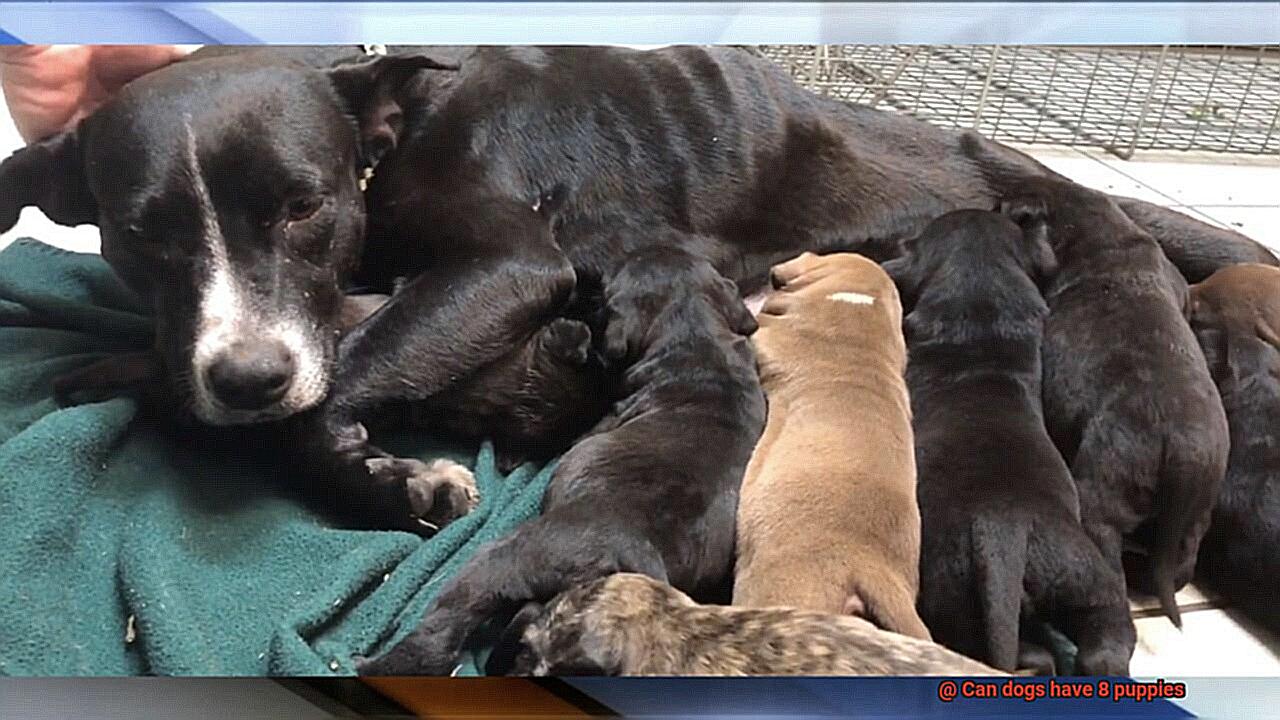Can dogs have 8 puppies?
Picture this: a room filled with wagging tails, tiny paws, and an explosion of cuteness that fills your heart with overwhelming joy. Ah, the magic of welcoming a litter of puppies into our lives. As dog lovers, we can’t help but be captivated by this enchanting event. But here’s a question that often tickles our curiosity: Can dogs have eight puppies?
Today, we’re diving headfirst into the world of doggy parenthood to unravel this intriguing mystery. While litter sizes vary depending on breed and other factors, there’s something undeniably fascinating about the idea of a dog giving birth to not just a few, but eight adorable bundles of fur.
So get ready for an adventure as we explore the factors behind litter size, potential challenges, and the incredible journey that awaits both dog and owner during this miraculous time.
So grab your favorite canine companion (or simply snuggle up with your laptop), because we’re about to embark on an exciting journey filled with insights and captivating facts about the possibility of our furry friends bringing forth not just a handful, but eight precious little pups.

What Factors Influence the Size of a Dog’s Litter?
Contents
- 1 What Factors Influence the Size of a Dog’s Litter?
- 2 The Average Litter Size for Dogs
- 3 Is Eight Puppies in a Litter Common or Guaranteed?
- 4 How Does Ovulation, Fertilization, and Implantation Affect Litter Size?
- 5 Complications During Pregnancy and Delivery
- 6 Breeding Practices to Increase the Chances of Bigger Litters
- 7 Pre-Natal Care for the Mother Dog
- 8 Be Prepared for a Larger Litter
- 9 Conclusion
Well, today I’m here to shed some light on this interesting topic. So, let’s dive right in and explore the factors that can affect the size of a dog’s litter.
- Breed: Ah, the lovely French Bulldog. While they’re known for their adorable looks and friendly personalities, they tend to have smaller litters compared to larger breeds like Golden Retrievers or German Shepherds. It’s all about genetics.
- Age: Just like us humans, age plays a role in a dog’s reproductive capabilities. Younger dogs may have smaller litters since their reproductive systems are still developing. On the other hand, older dogs might surprise you with larger litters due to their fully matured reproductive organs.
- Health and Nutrition: A healthy diet and overall well-being are crucial for your pup’s litter size. Dogs that receive proper nutrition and are in good health are more likely to have larger litters. So, make sure your furry friend is getting all the nutrients they need.
- Genetics: Here’s where genes come into play. If both the mommy and daddy dogs come from lines with a history of big litters, chances are their offspring will also have larger litters. On the flip side, if one or both parents have smaller litter histories, it’s more likely their puppies will follow suit.
- Reproductive History: A dog’s previous reproductive history can give you clues about future litter sizes. If your pooch has had large litters before, well, get ready for more. And if they’ve had complications or smaller litters in the past, it might indicate a trend towards smaller litters in the future.
- Environmental Factors: Stress, temperature, and exposure to certain chemicals or toxins can influence a dog’s reproductive system and ultimately impact litter size. So, create a peaceful and healthy environment for your pregnant pup to maximize the chances of a bigger litter.
While these factors can provide insights into litter size, it’s important to remember that each dog is unique, and individual variation is common. If you’re planning to breed your French Bulldog or have any concerns, it’s always best to consult with a veterinarian or professional breeder for personalized advice.
The Average Litter Size for Dogs
French Bulldogs, known for their charming personalities and iconic bat-like ears, are a popular breed among dog lovers. But have you ever wondered how many puppies these adorable pooches typically have in a litter? Well, grab your treat bag and let’s dig into the average litter size for French Bulldogs.
The Average Litter Size: Not Just a Numbers Game
When it comes to French Bulldogs, the average litter size falls within the range of 3 to 5 puppies. However, it’s important to remember that this is just an average. Some Frenchies may have smaller litters of 1 or 2 puppies, while others might surprise you with larger litters of 6 or more.
It’s All in the Genes
Genetics play a significant role in determining the litter size of French Bulldogs. Breeding practices that prioritize healthy genes and avoid inbreeding can help increase the chances of having a healthy litter. Responsible breeders carefully select parent dogs with desirable traits and monitor their health to ensure the best outcomes for both mother and puppies.
Age Ain’t Just a Number
The age of a French Bulldog can also influence its litter size. Generally, younger females tend to have smaller litters, while older ones may produce larger ones. This is because mature females have a higher number of eggs, increasing the likelihood of a bigger brood.
Health Matters
The overall health of a French Bulldog is crucial in determining the size of its litter. Dogs with underlying health issues may have smaller litters due to reproductive challenges. It’s essential to provide regular veterinary care, maintain a balanced diet, and ensure optimal health before considering breeding.

Environmental Factors: Mother Nature’s Influence
Environmental factors can also impact litter size. Stress, nutritional deficiencies, and exposure to toxins can affect fertility and reduce the number of puppies. Creating a calm and nurturing environment for your French Bulldog during pregnancy can help optimize the chances of a healthy litter.
It’s Not Just Quantity, but Quality
While having a large litter may seem exciting, it’s important to remember that the quality of each puppy matters too. With larger litters, there may be increased competition for resources, making it crucial to monitor the health and well-being of each puppy closely. Adequate nutrition, proper socialization, and regular veterinary check-ups are essential for their development.
Is Eight Puppies in a Litter Common or Guaranteed?
French Bulldogs are beloved for their unique appearance and playful personalities. If you’re a proud owner or considering adding one to your family, you may be wondering about the size of their litters. Are eight puppies in a litter common or guaranteed? Well, let’s dive into the topic and unleash the facts.
Factors That Influence Litter Size
When it comes to French Bulldogs, several factors can influence the size of their litters. Here are the key factors to consider:
- Genetics: The genetics of both the mother and father dog play a significant role in determining litter size. Some French Bulldogs are genetically predisposed to having larger litters, while others may have smaller ones.
- Age of the Mother: Just like humans, the age of the mother dog can affect litter size. Younger dogs tend to have larger litters, while older dogs may have smaller ones.
- Health and Nutrition: Optimal health and nutrition are crucial during pregnancy. Poor nutrition or underlying health issues can lead to smaller litter sizes or complications.
- Breeding Practices: The breeding practices used can also impact litter size. Responsible breeders carefully select compatible parents to increase the chances of larger litters.
8 Puppies in a Litter: Possible but not Guaranteed
While French Bulldogs typically have litters ranging from 3 to 5 puppies, it is not uncommon for them to have larger litters. However, it is essential to understand that having eight puppies in a litter is not guaranteed.
It’s important not to place unrealistic expectations on your French Bulldog’s litter size. Each pregnancy can vary, even within the same breed. Instead, focus on providing the best care possible for your dog throughout her pregnancy and beyond.
Tips for Supporting a Healthy Pregnancy

To support a healthy pregnancy for your French Bulldog, consider these tips:
- Provide a balanced diet: Consult with your veterinarian to ensure your dog’s diet meets her nutritional needs during pregnancy.
- Regular veterinary check-ups: Regular veterinary check-ups are essential to monitor the health of both the mother and puppies.
- Create a comfortable environment: Prepare a clean and comfortable whelping area for your dog to give birth and care for her puppies.
- Emotional support: Offer plenty of love, attention, and mental stimulation to keep your dog happy and stress-free during pregnancy.

How Does Ovulation, Fertilization, and Implantation Affect Litter Size?
If you’re a proud French Bulldog owner, you might be curious about how ovulation, fertilization, and implantation affect the size of your dog’s litter. While every dog is unique, understanding these processes can give you insight into what to expect when your Frenchie is expecting. So, let’s dive into the fascinating world of reproduction in dogs.
Ovulation: It All Starts with Timing

Ovulation is a crucial step in the reproductive cycle of dogs. During their heat, which typically occurs every six to twelve months, French Bulldogs have their chance at motherhood. Ovulation occurs around the 10th to 14th day of their heat cycle. However, keep in mind that each dog is different, and the timing can vary. So, it’s essential to monitor your Frenchie’s behavior and consult with your veterinarian for accurate timing.
Fertilization: The Dance of Sperm and Egg
Once ovulation takes place, it’s time for fertilization to occur. When a male dog successfully mates with a female during her fertile period, his sperm has the opportunity to meet and penetrate the released egg. However, not all eggs released during ovulation are fertilized. Factors like the timing of mating, sperm quality, and overall reproductive health play a role in determining whether fertilization is successful.
Implantation: Nesting in the Uterine Lining
After fertilization, it’s time for implantation to take place. The zygote travels down the fallopian tubes and reaches the uterus, where it implants itself into the uterine lining. This process provides essential nutrients and oxygen to the developing embryos through the placenta. In French Bulldogs, implantation usually occurs around 18 to 25 days after ovulation.
Effect on Litter Size: The Magic Number
Now, here’s the moment you’ve been waiting for – how do these processes affect litter size in French Bulldogs? Well, several factors come into play. Firstly, the number of eggs released during ovulation can impact litter size. French Bulldogs typically release multiple eggs, and each egg can be fertilized by a different sperm. So, the more eggs that are released and successfully fertilized, the higher the chances of a larger litter.
Additionally, the quality of sperm and its ability to fertilize the eggs also influence litter size. If either the male or female dog has poor sperm quality or low fertility, it can decrease the number of viable embryos.
The timing of mating is crucial too. If mating occurs too early or too late in relation to ovulation, it can lower the chances of successful fertilization and result in a smaller litter size.
Complications During Pregnancy and Delivery
French Bulldogs are adorable and beloved companions, but like any other breed, they can experience complications during pregnancy and delivery. As a responsible dog owner, it’s important to be aware of these potential complications and how to recognize them. So, let’s dive into the world of French Bulldog reproduction and explore some of the common issues that can arise.
- Dystocia: This is a fancy word for difficult or prolonged labor. French Bulldogs have a unique body shape with broad shoulders and narrow hips, which can make birthing a challenge. If your Frenchie is straining excessively without progress or seems uncomfortable during labor, it could be a sign of dystocia. In such cases, veterinary intervention is crucial to ensure the safe delivery of the puppies.
- Eclampsia: Also known as milk fever, eclampsia occurs when a nursing mother’s calcium levels drop too low. It usually happens within the first few weeks of lactation and can cause muscle tremors, weakness, and even seizures in the mother. Keep an eye on your Frenchie’s calcium levels during this time and provide appropriate supplementation if needed.
- Infections: Just like any other dog, French Bulldogs can develop infections during pregnancy or after delivery. Metritis is an infection of the uterus that can cause fever, lethargy, and a foul-smelling discharge. Mastitis is an infection of the mammary glands that leads to swelling, redness, and pain in the mammary tissue. These infections require prompt veterinary treatment to ensure the health of both the mother and her puppies.
- Retained Placenta: Sometimes, one or more placentas may not be expelled after the birth of the puppies. This can lead to infection if left untreated. Keep an eye out for any signs of retained placenta such as a foul smell or abnormal discharge.
- Uterine Rupture: Although rare, uterine rupture can occur during delivery and is a life-threatening condition. It causes severe pain, hemorrhage, and can be fatal for the mother. If your Frenchie shows signs of extreme pain during labor, contact your veterinarian immediately.
Remember, early detection and prompt veterinary care are essential in managing complications during pregnancy and delivery in French Bulldogs. Regular prenatal check-ups and close monitoring by a professional can help identify any potential issues and ensure the best possible outcome for your Frenchie and her puppies.
Breeding Practices to Increase the Chances of Bigger Litters
Are you a French Bulldog owner and aspiring breeder? If so, you might be wondering how to increase the chances of bigger litters. Well, you’re in luck. In this article, we’ll explore some breeding practices that can help you achieve your goal. So, let’s dive right in.
- Breeding pairs: Choosing the right breeding pairs is paramount. Look for dogs with a track record of producing larger litters. Study their lineage and breeding records to identify individuals that consistently deliver more puppies.
- Age matters: Just like humans, dogs have prime breeding ages. Female French Bulldogs typically have larger litters between 2 and 5 years old. Breeding too early or too late in their lives can result in smaller litters.
- Health and nutrition: Healthy dogs are more likely to produce healthy and larger litters. Regular veterinary check-ups, proper vaccinations, and a balanced diet are essential for optimal health.
- Timing and frequency: Timing is everything. Track your female’s heat cycle accurately and breed her during her most fertile days. Also, allow enough time between breedings for her body to recover and prepare for another pregnancy.
- Artificial insemination: Sometimes, physical limitations prevent natural mating with highly desirable males. Artificial insemination allows breeders to use their semen, ensuring precise timing during the female’s peak fertility period.
- Genetic diversity: Maintaining genetic diversity within your breeding program is vital for bigger litters. Inbreeding or closely related matings can lead to genetic abnormalities and smaller litter sizes. Introduce new bloodlines to keep your breeding pairs healthy and fertile.
- Stress reduction: Stress can negatively affect a dog’s reproductive system, resulting in smaller litters. Provide a stress-free environment by minimizing disturbances, loud noises, and unnecessary handling during the breeding process.
By implementing these breeding practices, you can increase the likelihood of bigger litters. However, it’s important to remember that factors like genetics and individual dog characteristics can also influence litter size.
Remember, breeding French Bulldogs requires responsible practices and a deep understanding of the breed. If you’re unsure or need guidance, consult with experienced breeders or veterinarians who can provide valuable insights.
Pre-Natal Care for the Mother Dog
Bringing new life into the world is an exciting and special time, especially when it comes to your beloved French Bulldog. To ensure a healthy pregnancy for your furry friend and the best possible start for her puppies, pre-natal care is of utmost importance. Let’s dive into the key aspects of pre-natal care for your French Bulldog mama.
- NUTRITION: A balanced diet is crucial for a healthy pregnancy. During this time, your French Bulldog’s nutritional needs increase significantly. Opt for a high-quality, specifically formulated diet for pregnant or nursing dogs. Look for diets rich in protein, calcium, and omega-3 fatty acids to support the proper development of the puppies.
- VETERINARY CHECK-UPS: Regular visits to the veterinarian are essential during your French Bulldog’s pregnancy. Your vet will monitor her health, administer necessary vaccinations and deworming treatments, and conduct ultrasound examinations to ensure the healthy development of the puppies. Any concerns or complications can be addressed promptly by your vet.
- EXERCISE AND REST: Moderate exercise is important to maintain muscle tone and overall fitness during pregnancy. However, excessive exercise should be avoided as it can place unnecessary stress on your French Bulldog’s body. Regular walks and playtime are beneficial, but always pay attention to her energy levels and adjust accordingly. Adequate rest is equally important, as pregnant dogs require more sleep to support their growing bodies.
- NESTING AREA: Create a comfortable and safe nesting area for your French Bulldog to give birth and care for her puppies. Choose a quiet, secluded space in your home where she can have privacy. Provide soft bedding that can be easily cleaned and replaced if necessary. Ensure the area is warm and draft-free, as puppies are sensitive to temperature changes.
- PREPARING FOR WHELPING: Familiarize yourself with the signs of labor, such as restlessness, panting, nesting behavior, and a drop in body temperature. Have your veterinarian’s emergency contact number readily available in case of complications. Gather necessary supplies such as clean towels, sterile scissors for cutting umbilical cords, and a heating pad or hot water bottle to maintain the puppies’ body temperature.
Be Prepared for a Larger Litter
You’re expecting a litter of puppies, and not just any litter – a larger litter. Congratulations, it’s going to be an exciting and rewarding experience. However, it’s important to be prepared for the unique challenges that come with a larger litter, especially if you have French Bulldogs.
Increased Resource Demand
With more puppies to care for, the mother dog will require a higher calorie intake to produce enough milk for all her offspring. Consulting with a veterinarian to determine the appropriate diet and feeding schedule is crucial. Ensuring an ample supply of nutritious food is essential for the health and growth of both the mother and puppies.
Providing Adequate Space
A larger litter means more space is needed for the mother dog and her puppies. Creating a clean and comfortable whelping area is vital to their well-being. Consider using a whelping box or designating a specific area with appropriate bedding and temperature control. This allows each puppy to have its own space while still being close to their mother.
Mental Preparation
Caring for a larger litter can be demanding and time-consuming. It requires dedicating ample time and attention to each puppy’s individual needs, including feeding, socialization, and training. Don’t hesitate to seek advice from experienced breeders or veterinarians and consider enlisting additional caregivers if necessary.
Health Monitoring
Having a larger litter comes with certain risks and challenges. The mother dog may experience increased strain on her body during pregnancy and labor, which could lead to complications. Regularly monitoring the health of both the mother and puppies is essential. If any concerns arise, don’t hesitate to seek veterinary assistance.
Finding Suitable Homes
As responsible breeders, it’s important to find suitable homes for all the puppies in your larger litter. Carefully screen potential adopters and ensure they are committed to providing a loving and responsible environment for the puppies. Providing them with necessary information about the breed’s specific needs and characteristics is crucial for their well-being.
rfF7C7y4HYc” >
Conclusion
In conclusion, it is indeed possible for dogs to have a litter of eight puppies.
This is not an uncommon occurrence in the canine world. The reproductive capabilities of dogs can vary, but many breeds are capable of producing litters of this size.
While some dogs may have smaller litters or larger litters, eight puppies is well within the realm of possibility.




